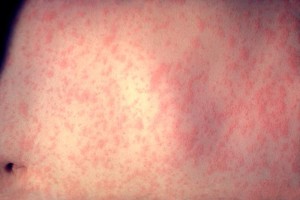New York: University of Rochester student confirmed positive for measles
Just days following three measles cases confirmed in the Albany region and Rockland County, the New York State Department of Health (DOH) today confirmed that a University of Rochester student recently treated at Strong Memorial Hospital had the measles.
Although the student has fully recovered and is no longer contagious, people who were potentially exposed on the University campus are being alerted.
Specifically, health authorities say if you were a patient or visitor at Strong Memorial Hospital, and have not been immunized against measles, you may be at-risk for contracting the disease IF you were in any of the following locations within the facility or passed through them:
- The Emergency Department waiting room from Jan. 31 at 10:09 pm to Feb. 1 at 1:41 am.
- In the Emergency Department treatment areas from Jan. 31 at 10:41 pm to Feb. 1 at 10:22 pm.
- In the Extended Observation unit from Feb. 1 at 7:22 pm to Feb. 3 at 9:45 am.
The University of Rochester has checked the vaccination records of its students and is preparing to inform faculty and staff about what steps will be required to prevent the spread of the illness. Anyone who visited the University of Rochester’s River Campus between Monday, Jan. 27, and Friday, Jan. 31, may have been exposed.

Measles rash
Image/CDC
The DOH says Individuals are not at-risk of contracting measles if they are immune. A person is considered immune if he or she has received two doses of Measles, Mumps, and Rubella (MMR) vaccine, OR if he or she was born before January 1, 1957, OR has a history of laboratory-confirmed measles, OR has a blood test confirming measles immunity. Any of the above confers immunity. Individuals who are not immune to measles, and who become ill with rash or fever should call their medical providers, local emergency room, or county health department and let them know of a possible measles exposure BEFORE visiting the office so steps can be taken to avoid possibly exposing others.
Measles or rubeola, is an acute highly communicable viral disease that is characterized by Koplik spots in the cheek or tongue very early in the disease. A couple of days later a red blotchy rash appears first on the face, and then spreads, lasting 4-7 days. Other symptoms include fever, cough and red watery eyes. The patient may be contagious from four days prior to the rash appearance to four days after rash appearance.
The disease is more severe in infants and adults. Complications from measles which is reported in up to 20% of people infected include; seizures, pneumonia, deafness and encephalitis.
The single best way to prevent measles is through vaccination. According to the Centers for Disease Control and Prevention, during the decade before the measles vaccination program began, an estimated 3–4 million people in the United States were infected each year, of whom 400–500 died, 48,000 were hospitalized, and another 1,000 developed chronic disability from measles encephalitis.
Widespread use of measles vaccine has led to a greater than 99% reduction in measles cases in the United States compared with the pre-vaccine era, and in 2012, only 55 cases of measles were reported in the United States.
For more infectious disease news and information, visit and “like” the Infectious Disease News Facebook page and the Outbreak News This Week Radio Show page.














